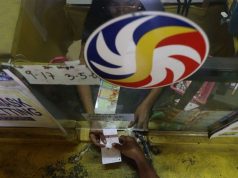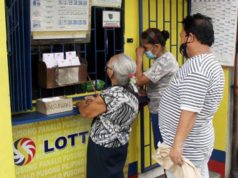
MANILA – Philippine Charity Sweepstakes Office (PCSO) General Manager Alexander Balutan has countered allegations that Small Town Lottery (STL) outlets have mushroomed illegally and are proving to be a bane to society, pointing out that it is, in fact “earning billions for the indigents.”
Balutan was reacting to Davao Oriental Governor Nelson Dayanghirang, who earlier asked him to regulate STL operations in his province.
“We strengthened the law by crafting a new Implementing Rules and Regulations (IRR) that breaks the monopoly of gambling lords who do not pay taxes that continue to undermine the government and corrupt the many,” Balutan said in a press statement Tuesday.
Balutan and PCSO Chairman Joe Jorge Corpuz were appointed to the agency by President Rodrigo Duterte in September 2016.
At present, there are 92 approved Authorized Agent Corporations (AACs) playing STL nationwide from just 18 in the previous administration.
Of the 92, PCSO said 82 were operating while the rest have yet to start, hopefully before the end of this year.
Earlier, Dayanghirang said that STL outlets had mushroomed in the province and had been indiscriminately placed near schools, churches and along the highway.
The proliferation of STL outlets, according to the provincial government, “encouraged the culture of gambling among residents while adversely affecting the province’s image.”
Balutan, however, said STL is a responsible gaming, unlike jueteng and its variants that promote unregulated and excessive gambling, which in turn has been the source of corruption.
He explained that jueteng has become a way of life of Filipinos since the Spanish era. Past administrations attempted to stop it but to no avail.
“Since everybody was in agreement that it can’t be eradicated, Congress passed a law in 2006 Republic Act 1169, to regulate these illegal numbers game through STL,” Balutan said.
“Without STL, local government officials failed to stop the proliferation of the illegal numbers games in their areas of responsibilities, and now they question the presence of STL outlets?” he added.
Balutan pointed out that STL is becoming a very potent instrument in the battle against jueteng, swertres, masiao and other forms of illegal gambling. “Now, illegal gambling lords are crying,” Balutan stressed.
“The gaming now is very transparent (not rigged), earning billions of pesos for the indigents,” he added.
P15B revenues seen by end-November
In October, STL had earned P1.7 billion from P1.5 billion in September. STL revenues could go as high as P15 billion by the end of November.
Balutan said 30% of the income of the STL operators goes back to them in terms of charity services, aside from the estimated 600,000 jobs (as kabos, kubrados..etc) legally created for them, earning P6,000-P7,000 monthly.
“These employees are those who cannot be qualified in normal job fairs due to lack of education, people with disabilities and age and often vulnerable to committing various crimes specially drug use or trafficking,” Balutan said.
“Certainly PCSO will continue to regulate STL (specially the number of outlets) as it progresses,” he added.
While acknowledging the concerns and issues raised by the government, Balutan said PCSO is always open to criticisms and suggestions on how to better implement and manage the STL operations.
“If you have a pragmatic solution to all of these, I am very willing to listen,” said the PCSO chief.
Meanwhile, Balutan instructed the province’s branch manager, Virgilio Enrique Abanilla, to hold more consultations with the provincial government and mayors to fine-tune the operation of STL.
“The PCSO will make the necessary adjustments in the operation,” Abanilla assured the local officials.









